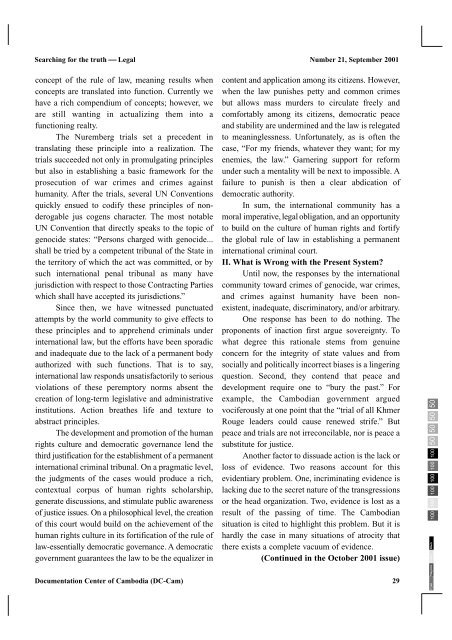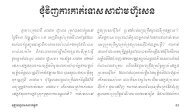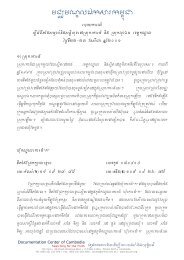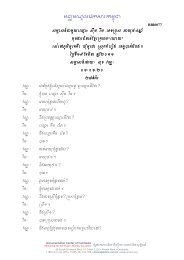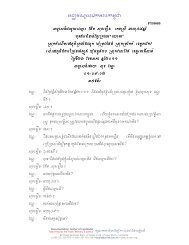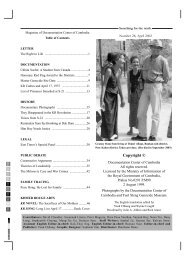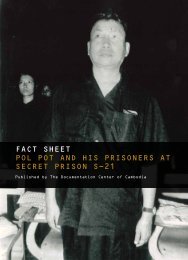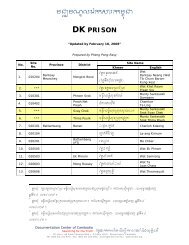Searching for the truth Issues 21 - Documentation Center of Cambodia
Searching for the truth Issues 21 - Documentation Center of Cambodia
Searching for the truth Issues 21 - Documentation Center of Cambodia
You also want an ePaper? Increase the reach of your titles
YUMPU automatically turns print PDFs into web optimized ePapers that Google loves.
<strong>Searching</strong> <strong>for</strong> <strong>the</strong> <strong>truth</strong> ⎯ Legal<br />
concept <strong>of</strong> <strong>the</strong> rule <strong>of</strong> law, meaning results when<br />
concepts are translated into function. Currently we<br />
have a rich compendium <strong>of</strong> concepts; however, we<br />
are still wanting in actualizing <strong>the</strong>m into a<br />
functioning realty.<br />
The Nuremberg trials set a precedent in<br />
translating <strong>the</strong>se principle into a realization. The<br />
trials succeeded not only in promulgating principles<br />
but also in establishing a basic framework <strong>for</strong> <strong>the</strong><br />
prosecution <strong>of</strong> war crimes and crimes against<br />
humanity. After <strong>the</strong> trials, several UN Conventions<br />
quickly ensued to codify <strong>the</strong>se principles <strong>of</strong> nonderogable<br />
jus cogens character. The most notable<br />
UN Convention that directly speaks to <strong>the</strong> topic <strong>of</strong><br />
genocide states: “Persons charged with genocide...<br />
shall be tried by a competent tribunal <strong>of</strong> <strong>the</strong> State in<br />
<strong>the</strong> territory <strong>of</strong> which <strong>the</strong> act was committed, or by<br />
such international penal tribunal as many have<br />
jurisdiction with respect to those Contracting Parties<br />
which shall have accepted its jurisdictions.”<br />
Since <strong>the</strong>n, we have witnessed punctuated<br />
attempts by <strong>the</strong> world community to give effects to<br />
<strong>the</strong>se principles and to apprehend criminals under<br />
international law, but <strong>the</strong> ef<strong>for</strong>ts have been sporadic<br />
and inadequate due to <strong>the</strong> lack <strong>of</strong> a permanent body<br />
authorized with such functions. That is to say,<br />
international law responds unsatisfactorily to serious<br />
violations <strong>of</strong> <strong>the</strong>se peremptory norms absent <strong>the</strong><br />
creation <strong>of</strong> long-term legislative and administrative<br />
institutions. Action brea<strong>the</strong>s life and texture to<br />
abstract principles.<br />
The development and promotion <strong>of</strong> <strong>the</strong> human<br />
rights culture and democratic governance lend <strong>the</strong><br />
third justification <strong>for</strong> <strong>the</strong> establishment <strong>of</strong> a permanent<br />
international criminal tribunal. On a pragmatic level,<br />
<strong>the</strong> judgments <strong>of</strong> <strong>the</strong> cases would produce a rich,<br />
contextual corpus <strong>of</strong> human rights scholarship,<br />
generate discussions, and stimulate public awareness<br />
<strong>of</strong> justice issues. On a philosophical level, <strong>the</strong> creation<br />
<strong>of</strong> this court would build on <strong>the</strong> achievement <strong>of</strong> <strong>the</strong><br />
human rights culture in its <strong>for</strong>tification <strong>of</strong> <strong>the</strong> rule <strong>of</strong><br />
law-essentially democratic governance. A democratic<br />
government guarantees <strong>the</strong> law to be <strong>the</strong> equalizer in<br />
<strong>Documentation</strong> <strong>Center</strong> <strong>of</strong> <strong>Cambodia</strong> (DC-Cam)<br />
Number <strong>21</strong>, September 2001<br />
content and application among its citizens. However,<br />
when <strong>the</strong> law punishes petty and common crimes<br />
but allows mass murders to circulate freely and<br />
com<strong>for</strong>tably among its citizens, democratic peace<br />
and stability are undermined and <strong>the</strong> law is relegated<br />
to meaninglessness. Un<strong>for</strong>tunately, as is <strong>of</strong>ten <strong>the</strong><br />
case, “For my friends, whatever <strong>the</strong>y want; <strong>for</strong> my<br />
enemies, <strong>the</strong> law.” Garnering support <strong>for</strong> re<strong>for</strong>m<br />
under such a mentality will be next to impossible. A<br />
failure to punish is <strong>the</strong>n a clear abdication <strong>of</strong><br />
democratic authority.<br />
In sum, <strong>the</strong> international community has a<br />
moral imperative, legal obligation, and an opportunity<br />
to build on <strong>the</strong> culture <strong>of</strong> human rights and <strong>for</strong>tify<br />
<strong>the</strong> global rule <strong>of</strong> law in establishing a permanent<br />
international criminal court.<br />
II. What is Wrong with <strong>the</strong> Present System?<br />
Until now, <strong>the</strong> responses by <strong>the</strong> international<br />
community toward crimes <strong>of</strong> genocide, war crimes,<br />
and crimes against humanity have been nonexistent,<br />
inadequate, discriminatory, and/or arbitrary.<br />
One response has been to do nothing. The<br />
proponents <strong>of</strong> inaction first argue sovereignty. To<br />
what degree this rationale stems from genuine<br />
concern <strong>for</strong> <strong>the</strong> integrity <strong>of</strong> state values and from<br />
socially and politically incorrect biases is a lingering<br />
question. Second, <strong>the</strong>y contend that peace and<br />
development require one to “bury <strong>the</strong> past.” For<br />
example, <strong>the</strong> <strong>Cambodia</strong>n government argued<br />
vociferously at one point that <strong>the</strong> “trial <strong>of</strong> all Khmer<br />
Rouge leaders could cause renewed strife.” But<br />
peace and trials are not irreconcilable, nor is peace a<br />
substitute <strong>for</strong> justice.<br />
Ano<strong>the</strong>r factor to dissuade action is <strong>the</strong> lack or<br />
loss <strong>of</strong> evidence. Two reasons account <strong>for</strong> this<br />
evidentiary problem. One, incriminating evidence is<br />
lacking due to <strong>the</strong> secret nature <strong>of</strong> <strong>the</strong> transgressions<br />
or <strong>the</strong> head organization. Two, evidence is lost as a<br />
result <strong>of</strong> <strong>the</strong> passing <strong>of</strong> time. The <strong>Cambodia</strong>n<br />
situation is cited to highlight this problem. But it is<br />
hardly <strong>the</strong> case in many situations <strong>of</strong> atrocity that<br />
<strong>the</strong>re exists a complete vacuum <strong>of</strong> evidence.<br />
(Continued in <strong>the</strong> October 2001 issue)<br />
29<br />
100 100 100 100 100 100 50 50 50 50<br />
Black<br />
Yellow<br />
Magenta<br />
Cyan


